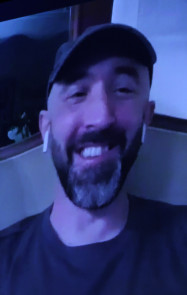Still a place of refuge? National Poetry Day raises questions

National Poetry Day 2023, and its theme of ‘Refuge’. For me that meant a bus trip into Newcastle on Thursday evening, to the university’s Culture Lab, to hear two poets – Jacqueline Saphra and Kostya Tsolakis – whose new collections are being promoted by the Poetry Book Society, which is based on Tyneside, and was founded by TS Eliot.
Both poets have a story of refuge to tell. For Jacqueline Saphra it is from the Holocaust, in which most of her family were murdered. Greek-born Kostya Tsolakis found himself seeking sanctuary in England, a place where he could breathe, freer from the homophobia that he felt then in his home country. That was 25 years ago, and he still lives here. But sadly he does not feel the same way about his adopted country these days.
More personally, he was only able to join the reading via Zoom, because his father had died a few days earlier, and the funeral was the next day. But he added: “It is lovely and comforting to be doing this from my father’s favourite armchair here in Athens.”
His debut collection is titled Greekling, which means a Greek that “doesn’t fit the mould, in terms of culture, sexuality, behaviour”. A ghazal from the collection, ‘Of Them’, captures the tension that he felt at home:
Long summers home from uni, we still pretend: I’m not one of them.
Those men on the news at night. The all-gay cruise. Mum makes fun of them.
…
All I can think of: in England – not checking myself. What I say, how I look.
The handsome lads in the clubs. How I love. Every mother’s son of them.

Towards the end of his reading he added: “In recent years I’ve been reconciling my relationships with Greece. But that’s what England gave me, the ability to be myself.”
The title poem of Jacqueline Saphra’s new collection, Velvel’s Violin, encapsulates in a few short lines the horror, the evil and the tragedy of the Holocaust, such as a husband witnessing his wife being buried alive by the Gestapo: “The graves are moving, the graves are moving! / He told the ghetto, and lost the will to live.”
Her opening poem, ‘Anxious Jewish Poem’, addresses the everyday state of alert that Jewish people still feel, even in somewhere like the UK, where there are “still the Jewish money gags”: “So keep your Jewish head down / and your Jewish bag well packed / … always be prepared to move.”
She addresses modern-day conspiracy theories in a series of short poems about conversations overheard on the train, adding: “Eventually they get to Jews, which is where all conspiracy theories kind of end up.”
During her reading she insisted there was also “joy in this book”, in poems such as ‘The News and the Blackbird’, written around the time of Russia’s invasion of Ukraine:
But today the blackbird
sang suddenly in the key
of joy: Look out! Look up!
and what else could I do
but obey as she folded
into the green desire
of plum tree, home
to her nest that lay
hidden, chick-heavy
and ravenous behind
a celebration of leaves.
Saphra also pays tribute to the strength of family, and generations, and their ragtag skills:
These are the rags our foremothers and forefathers
pieced together like prayers in the murk of sweatshops
scraps they schlepped from door to door to earn
something out of nothing manna for the survivor
('Shmattes')
Saphra is also a playwright, teacher and activist, and a former stand-up comedian. She has been shortlisted for the TS Eliot poetry prize, and teaches at the Poetry School. There is also a poem in her new collection titled ‘Madagascar’, about a German plan to send the Jews to Africa, before they settled on another, Final Solution. For Saphra, as for Gary Lineker, the urge of Suella Braverman and others to send deportees to Rwanda has worrying resonances.
In a Q&A conducted by Irish poet and university lecturer Tara Bergin, Kostya Tsolakis, who is the founding editor of an online magazine for people writing in English as a second or parallel language, said that when he first came to England in the “New Labour 90s”, it felt “such a positive, accepting place”. He had now been living here for 25 years, “and it has changed massively. I now feel more foreign here than when I arrived. Brexit changed everything.”
The event, staged in conjunction with Newcastle Centre for the Literary Arts, was well attended by poets, poetry and creative writing students and others, with the concerns expressed during the evening properly reflecting the National Poetry Day theme of Refuge. Some might say such concerns are “doing England down”. Others might say that this is poetry reflecting truth, how things are; and how things might be changed.




